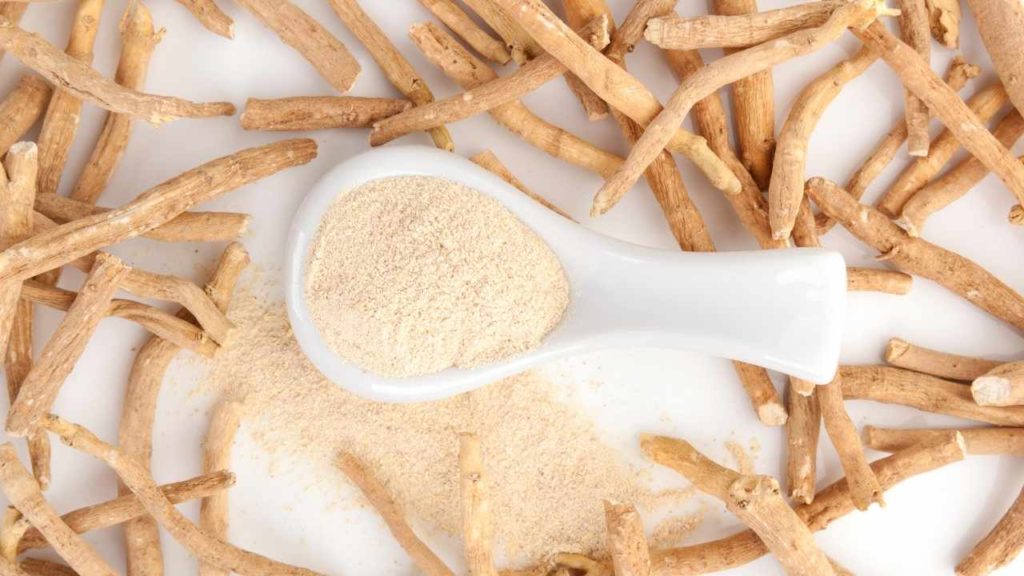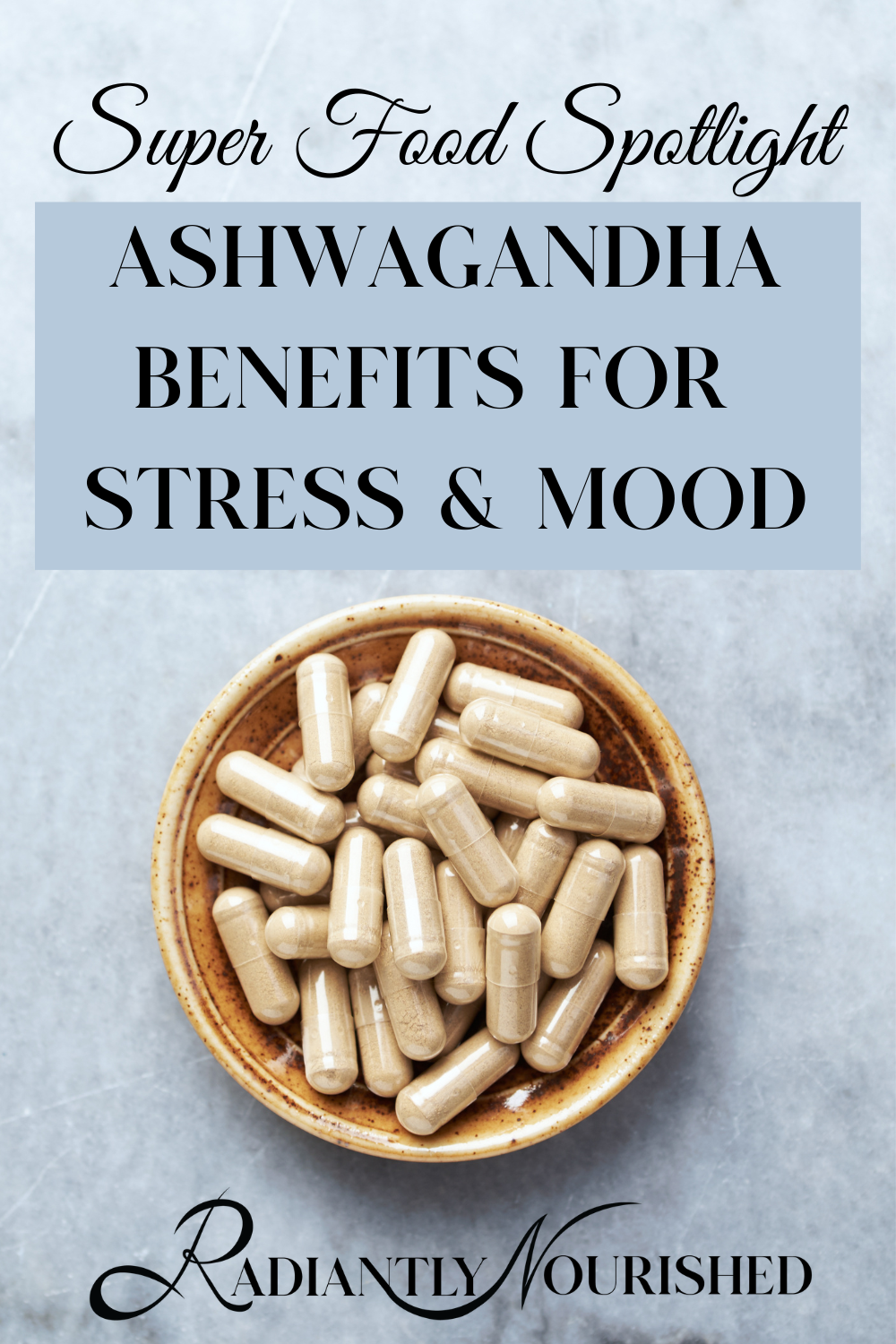Discover ashwagandha benefits for stress and mood and learn how to incorporate this healing adaptogen into your everyday lifestyle.

If you have trouble calming your nerves in stressful situations, you’ve probably heard ashwagandha can help. Ashwagandha benefits for stress and mood are plentiful and something you definitely don’t want to miss out on.
Being the world’s most ancient body healing system, which uses a mixture of spices and herbs to cure people, Ayurveda is a proven holistic approach to Indian medicine. However, there’s one such herb that is believed to treat almost every ailment out there miraculously and is even mentioned in the books of mythology. The Sanskrit words Ashwa, which means horse, and Gandha, which denotes fragrance, are combined to form the phrase ashwagandha. The ancient herb is believed to increase energy levels and quickly improve health.
Here we discuss everything you need to know about ashwagandha, including the benefits for people suffering from anxiety and stress.
What is Ashwagandha?
Ashwagandha comes from the adaptogen herb family, which provides several health benefits when taken as supplements, tinctures, powders, or teas.
Withania Somnifera is the other name for ashwagandha. It is also known as poison gooseberry, Indian ginseng, and winter cherry in different parts of the world. The herb is extracted from an evergreen shrub native to the middle east, north Africa, and parts of India. This little shrub’s roots and plant extracts are used as active ingredients in various medications.
History of Ashwagandha
Ashwagandha’s history can be traced back to almost 6,000 BC, first described in India’s well-known ancient traditional medicine, Ayurveda. It was initially regarded as a powerful herb capable of rejuvenating the body and helping people live longer lives.
Hindu saints used the Vedas, a collection of Hinduism’s earliest known holy books, to record their healing knowledge. It also contains information about plants and herbs and how they were used during that time period.
The Rig Veda, written approximately 6,000 BC, has the oldest recorded mention of ashwagandha. In fact, the Vedas have numerous accounts of the benefits of using ashwagandha.
Benefits of Ashwagandha for Anxiety and Stress
Since it is an adaptogen, ashwagandha helps the body adapt to stressful situations. It has the ability to increase brain function as well as relieve symptoms of depression and anxiety.
This herb has benefited people with stress and anxiety disorders in multiple controlled human studies. In a 60-day trial of individuals with chronic stress, people who took ashwagandha supplements reported that it helped reduce their anxiety and insomnia by 69 percent, in comparison to 11% in the placebo group.
Ashwagandha has been proven to lessen stress levels by stabilizing cortisol levels. Apart from this, it reduces the risk of cancer and inflammation and improves immunological function, anti-aging, and memory. Therefore, people suffering from chronic anxiety and stress might benefit from ashwagandha.

Is Ashwagandha Safe?
Ashwagandha is generally thought to be safe. Having said that, research into herbal treatments is insufficient, and the formulations of these vary by herb greatly depending on where you purchase it. Hence, it’s always a good idea to watch your dosage and see a doctor before taking any herbal supplements. Remember, herbal medicine is still medicine and should be treated as such.
Will it make you sleepy?
Some research suggests that ashwagandha promotes sleep. With this information, you may assume that the ideal time to take ashwagandha is right before bedtime. While ashwagandha is beneficial for insomnia, it does not make you sleepy or drowsy if taken during the day.
Who Shouldn’t be Using ashwagandha?
Unfortunately, ashwagandha is not for everyone and might cause adverse side effects if consumed by some people.
People who have the following conditions should avoid using ashwagandha.
- Pregnant or Breastfeeding
Women who are pregnant or nursing must check with their Ob/Gyn before taking any herbal supplements. Using ashwagandha during pregnancy is not recommended since it is believed to induce miscarriages. However, because there isn’t enough information on the effects of ashwagandha on breastfeeding, doctors advise against using it.
- Autoimmune conditions
According to research, ashwagandha can boost immune activity. While many people might benefit from this, it might be harmful to those who suffer from autoimmune diseases. In fact, it can exacerbate symptoms of diseases like systemic lupus, multiple sclerosis, or rheumatoid arthritis. And therefore, should be avoided.
- Diabetes
Animal studies show that Withania Somnifera may help patients with diabetes by lowering blood sugar levels. While this may appear to be good news for diabetics, it can also be dangerous. Because people with diabetes already use medications to control their blood sugar, adding ashwagandha to their regimen might cause their blood sugar to drop to dangerously low levels.
- Stomach Ulcer
Ashwagandha may irritate the lining of the GI tract. Hence, using ashwagandha supplements might cause mild gastric inflammation in some people and is not recommended for those suffering from stomach ulcers.
Radiantly Nourished Recommended Ashwagandha Brands
I am currently taking the Organic India Ashwagandha Supplement and I love it. It is in whole herb form, USDA organic, sustainably made, and has a quality guarantee. When supplementing Ashwagandha, I would recommend capsules rather than gummies to get the herb in its whole form without the extra additives.

The Recommended Dose
In general, daily doses of 120 mg to 2g of ashwagandha root powder is safe to use with other treatments. However, it is advised that you see a physician before you start self-supplementation. Also as we mentioned above, ashwagandha is not suggested for pregnant or nursing women since it has been believed to have abortifacient properties.
I hope you enjoyed learning all of the ashwagandha benefits for stress and mood! I would love to know how ashwagandha has helped you. Please leave a comment with your experience or start a conversation with me on Instagram DM’s. I always look forward to hearing from you.
✨🌿 To Stay Up To Date On All Things Beauty And Wellness:
Follow @radiantly.nourished on Instagram and connect with me on Pinterest, & TikTok.
Thank you for reading,
Jordana
READ NEXT:
Why Is Pomegranate Good For Your Skin?



